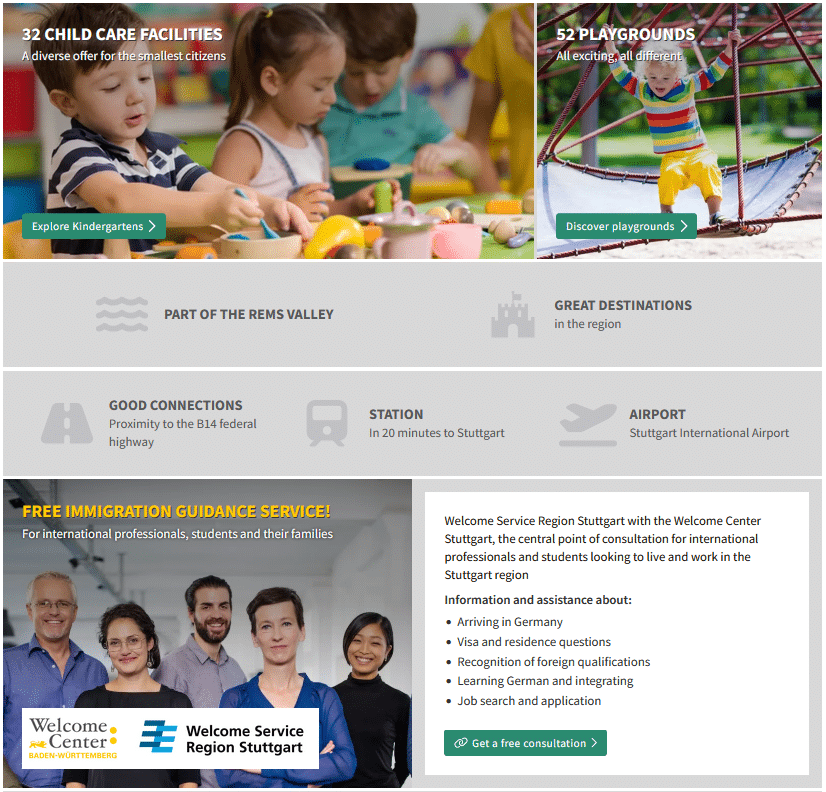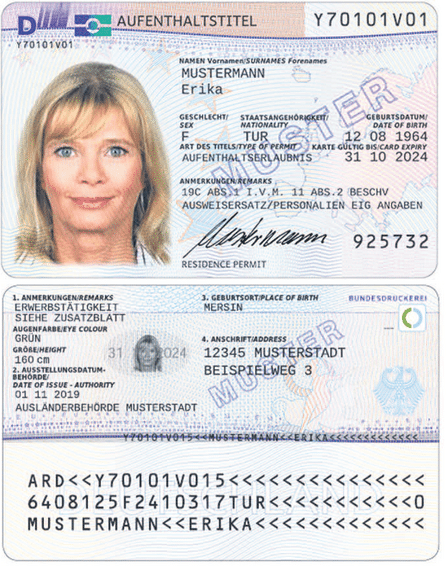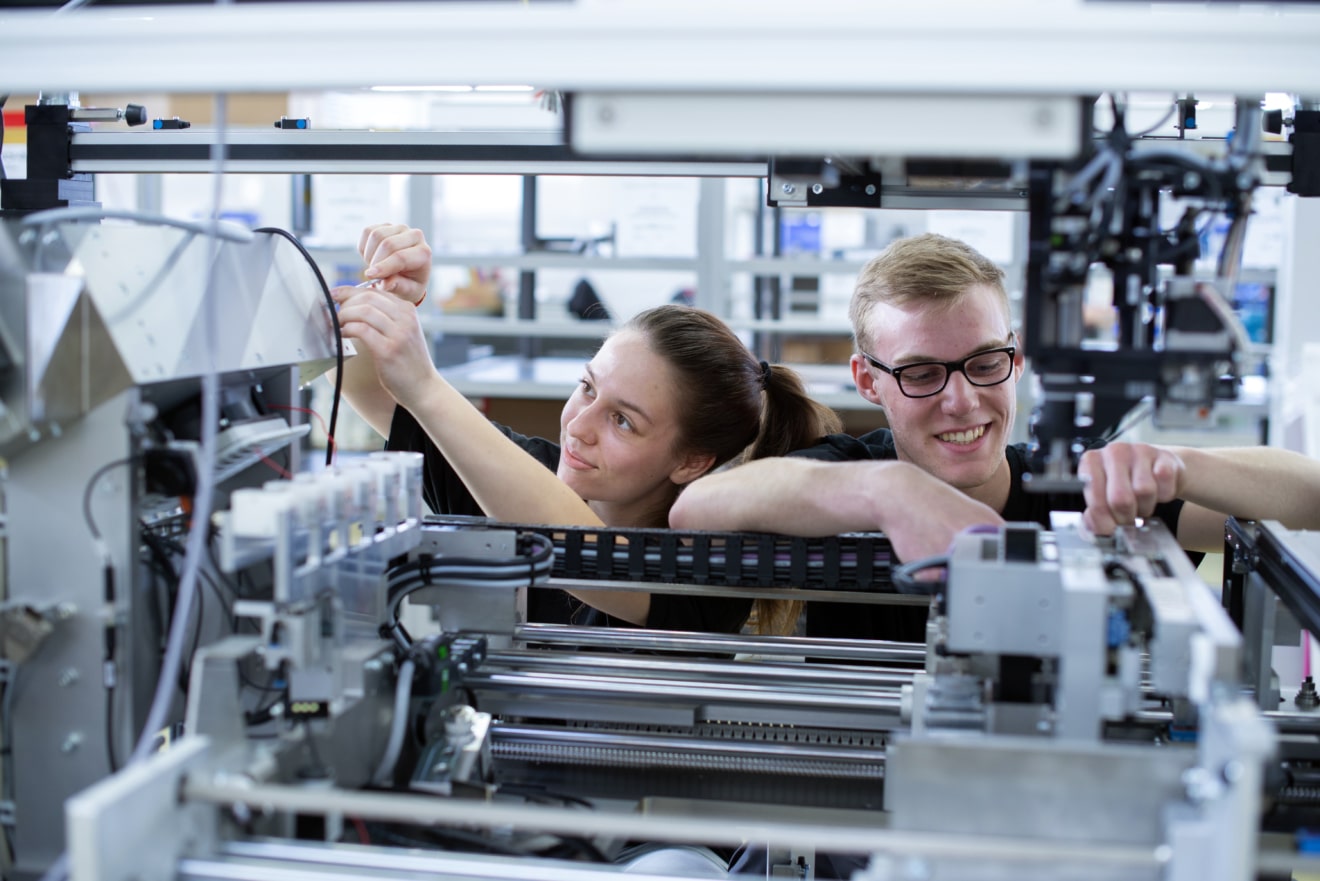
Information for companies
Would you like to employ international professionals or do you have vacancies that you cannot fill? Would you like to find out about the possibilities of recruiting abroad and the necessary formalities and processes? Or do you already employ foreign professionals and have questions about integration, learning German or onboarding? Then you’ve come to the right place!
The opportunities for hiring professionals from third countries have improved significantly in recent years with the Skilled Immigration Act. What needs to be considered when recruiting? We provide an overview.
Recruitment/recruitment of specialists
Search for international professionals
The search for foreign professionals is becoming increasingly important for small and medium-sized companies. Here are some effective approaches:
- Job fairs: International job fairs offer direct contact with potential applicants. Online fairs in particular make it possible to approach talent globally.
- Social media: Platforms such as LinkedIn, Facebook or Instagram help to disseminate targeted job advertisements and strengthen the employer brand at the same time.
- Job platforms: International job boards such as Indeed or Glassdoor are an excellent way to reach professionals abroad and in Germany.
- Alternative forms: For example, collaborations with foreign universities or participation in exchange programs provide direct access to qualified young talent.
- Active sourcing: You can use social networks or specialized platforms to search for suitable international specialists and approach them proactively.
- Company list: Send us your job offers so that we can pass them on to job seekers during consultations at the Welcome Center.
Job advertisements: Targeting foreign specialists
In order to attract qualified specialists from abroad, companies should design their job advertisements in a targeted and appealing way. Here are some important points:
English website:
A multilingual career page, ideally in English, makes the company more accessible to international applicants. It looks professional and makes the application process easier.
Career page on the website:
A dedicated careers page, which is clear and well-structured, offers international professionals clear guidance on open positions, corporate culture and application procedures.
Language requirements:
It is important to clearly define the required language skills. Companies should consider whether German is required at a high level or whether a good knowledge of English is sufficient to begin with in order to broaden the pool of applicants. List the language skills and certificates according to the European Framework of Reference.
Attractiveness of the jobs:
International applicants pay particular attention to additional offers such as support in finding accommodation, visa issues or language courses. Benefits like these can make all the difference. We are happy to support you!
Use platforms:
- Employment Agency: The job exchange of the Employment Agency is one of the largest job exchanges. Companies can advertise jobs here free of charge in Germany and other European countries via the EURES network. It is also possible to advertise jobs internationally via the Agentur für Arbeit through Make it in Germany.
- Make it in Germany: Companies can use this platform to contact foreign professionals directly. It also offers a lot of information for international applicants and employers. You can find a selection of job profiles in the job advertisements.
- The Employer Service of the Employment Agency supports companies in their search for new employees by advising on the creation and optimization of job advertisements and assisting with various recruitment processes. The most important information on labor market admission of workers and professionals from abroad can be found here.
- The International Placement Services of the Federal Employment Agency (ZAV) works with companies to meet their need for international professionals. After establishing contact, it provides support in creating job profiles and job offers, searches specifically for suitable international candidates and accompanies the entire recruitment process. After a successful placement, the ZAV helps with legal formalities such as visas and recognition as well as integration measures such as language courses.
- Companies from the IT/AI sector from the Stuttgart Region have wesayhi.tech to present themselves free of charge as employers for tech specialists or as cooperation partners for start-ups.
- THE LÄND offers the so-called Wall of Opportunities, a central point of contact for foreign professionals looking for career opportunities in the region. Companies from Baden-Württemberg can upload their vacancies here. The site is directly linked to the companies’ careers pages.
Employer branding – How do I become attractive to international professionals?
Employer branding is the positive and strategic shaping of an employer brand. In order to be attractive to international professionals, you can present yourself as a company that offers fair working conditions, a good work-life balance, development opportunities for foreign professionals and, for example, support with the visa process, finding accommodation and integration. An attractive location, i.e. a good infrastructure, educational opportunities, leisure activities and support with integration, also make you an interesting company.
Make the location advantages of your company digitally visible and actively integrate the Welcome Service Region Stuttgart. With Famigo, you can integrate a location infographic on your website free of charge (costs are only incurred for design adjustments). The graphic shows location advantages such as location, childcare options, medical infrastructure, schools, playgrounds or advisory services such as the Welcome Service.

Examples on company websites are:
Funded projects for recruiting professionals from abroad
Publicly funded projects offer comprehensive support for companies in the recruitment and integration of foreign professionals and at the same time promote sustainable development in the countries of origin. We have compiled a selection for you here:
Hand in Hand for International Talents
- Objective: Recruit professionals with vocational training from Brazil, India, Vietnam and the Philippines in the fields of electrical engineering, IT, metalworking and the hotel industry
- Support: Companies are supported in recruitment and integration through recognition procedures and administrative assistance.
- Brief profiles of the candidates can be found here.
THAMM (Immigration of professionals from North Africa)
- Focus: Recruitment of professionals and trainees from Egypt, Morocco and Tunisia
- Objective: To ensure fair and sustainable immigration of international professionals. Recruited foreign professionals are qualified according to German standards.
PAM (Partnerships for development-oriented training and labor migration)
- Objective: Qualification of professionals from Ecuador, Jordan and Vietnam in professions such as industrial mechanics and electronics
- Approach: Sustainable labor migration through German training standards in the countries of origin
UBAconnect
- Objective: To support companies in employing foreign professionals with partially recognized professional qualifications
- Full recognition of qualifications is sought through company adaptation qualifications.
Triple Win
- Objective: Placement of nursing staff from Serbia, Bosnia-Herzegovina and the Philippines in Germany
- Approach: The placement is fair and needs-oriented, while at the same time preventing a brain drain in the countries of origin.
Specialized!
- Goal: Recruitment of doctors from abroad (e. g. Mexico, Colombia, Jordan) to combat the shortage of doctors in Germany
- Approach: Comprehensive qualification and recognition processes, including language courses and professional adjustments, to integrate foreign doctors into the German healthcare sector
Projects of the Stuttgart Region Chamber of Skilled Crafts (HWK)
The Stuttgart Region Chamber of Skilled Crafts is involved in two targeted projects for the recruitment of international professionals:
1 ViFAH – Placement of Indian professionals and trainees in the skilled trades
ViFAH supports skilled trades companies in recruiting motivated trainees from India. The participants are pre-qualified, acquire German language skills at B1 level and are ready to start their training in the Stuttgart Region. The project facilitates integration by providing comprehensive support with organizational and official processes.
2nd FIT for German Climate Businesses – skilled professionals from Colombia and Uzbekistan for the skilled trades
This pilot project aims to recruit foreign professionals between the ages of 20 and 40 from Colombia and Uzbekistan for climate-related skilled trades. The selected international professionals will be prepared for life and work in Germany in their home countries before coming to the Stuttgart Region. The departure is planned for the period from February to April 2026.
Tips!
You can also find further offers for recruitment from abroad and private recruiters on our website in our database:
Further information on recruiting foreign professionals:
- Make it in Germany : At a glance – Recruiting skilled workers from abroad
- KOFA (Competence Center for Securing Skilled Workers) : Recommendation for action – Successfully recruiting and integrating international professionals
Visa/residence
Does my international professional need a visa or a residence permit in Germany?
Citizens from EU member states and EEA states
Citizens of EU member states and EEA states (European Economic Area) enjoy freedom of movement for workers within the European Union and can freely take up gainful employment.
You do not need a residence permit or a special work permit under immigration law. There is only a general obligation to register with the residents’ registration office.
For you as an employer, this means that you can employ these groups of people according to the same rules as German employees. General information on labor law can be found on the homepage of the Chamber of Commerce and Industry of the Stuttgart Region under the heading Labor and Social Law.

Citizens from third countries outside the EU
Persons from third countries outside the EU (so-called third-country nationals) require a visa or a valid residence permit to take up gainful employment in Germany. This must be applied for in advance of employment.
The employment of a third-country national without a corresponding visa or residence permit is illegal and is punishable by a fine.
Every visa or residence permit must clearly state whether and to what extent employment in Germany is permitted. The competent diplomatic mission or immigration office may restrict the work permit to a specific occupation and/or activity with a specific employer. Such ancillary provisions are either entered directly in the visa or recorded on a so-called “supplementary sheet”, which may be referred to in the residence permit.

Obligations of the employer:
- Check whether the visa or residence permit allows employment
- Keep a copy of the visa/residence permit
- After termination: Inform the foreigners authority within four weeks
General requirements for the issue of a visa or residence permit:
- Valid passport or passport substitute, no reason for deportation, secure livelihood
- specific requirements depending on the purpose of residence (e. g. a specific job offer in the case of work)
Which third-country nationals require a visa to enter the country?
Third-country nationals who wish to enter Germany for the purpose of gainful employment must apply for a visa for the purpose of gainful employment at the competent German diplomatic mission in the country in which they live before entering the country.
A visa for a limited period of time is usually issued for entry. This can be used to obtain a residence permit from the relevant immigration office in Germany.
Citizens of certain third countries are exempt from the obligation to apply for a visa for a longer stay abroad. These are, for example, citizens of Australia, Israel, Japan, Canada, the Republic of Korea, New Zealand, Great Britain and the USA as well as some other countries. A residence permit must then be applied for at the relevant immigration office within 90 days of entry.
Here you will find an overview of the countries that are exempt from the visa requirement.
Important!
There are also other residence permits (e. g. for refugees, family members, people looking for work, students) that also allow employment.
Tips!
- The Make it in Germany quick check for employers uses just a few questions to guide you through the search, recruitment and integration of international professionals or trainees living abroad.
- The Visa Navigator helps you to quickly and easily find the right visa that you need to enter and stay in Germany.
Further information:
- Website of the Federal Foreign Office
- Chamber of Commerce and Industry of the Stuttgart Region: Professionals from third countries – Who can come?
- Chamber of Commerce and Industry of the Stuttgart Region: Employment and training of refugees
Admission to the German labor market
Applicants from third countries generally require admission to the German labor market in order to be gainfully employed here. This is issued by the Federal Employment Agency in the visa procedure or can be obtained from the Federal Employment Agency before applying for a visa (preliminary approval). You can find out more about the labor market approval procedure on the website of the Federal Employment Agency.
Incidentally, some forms of employment are generally not subject to approval, e. g. the activities of visiting academics or professional athletes.
As an employer, you can obtain prior approval for employment from the ZAV labor market licensing office and have the employment contract checked.
Fast-track procedure for international skilled workers
There is also an accelerated procedure for issuing visas for the purpose of gainful employment, training or recognition of qualifications.
In this case, the employer applies for the visa in Germany at the immigration office in Germany on behalf of a international professionals, which speeds up the entire application process (including recognition of qualifications, labor market admission and visa date). Costs: € 411 per foreign worker.
The fast-track procedure for international skilled workers can be applied for at the local immigration office or at the state agency for the immigration of skilled workers.
Important!
- A fast-track procedure for international skilled workers is not possible for professionals residing in Germany!
- A fast-track procedure does not always lead to a faster result!
Further information:
- Make it in Germany: Fast-track procedure for international skilled workers including templates.
- Make it in Germany : The fast-track procedure for international skilled workers at a glance
Tips!
- The Chamber of Commerce and Industry of the Stuttgart Region and the Stuttgart Region Chamber of Skilled Crafts support member companies in carrying out the fast-track procedure for international professionals and compiling the required documents (see company service of the Chamber of Commerce and Industry of the Stuttgart Region and service offer of the Stuttgart Region Chamber of Skilled Crafts).
- For professions in the social economy, employers can contact the Welcome Center Social Economy.
Skilled Immigration Act (FEG)
Employing foreign employees – what you need to know in principle
The Skilled Immigration Act (FEG = Fachkräfteeinwanderungsgesetz), which came into force on March 1, 2020, has improved the regulations on the training and employment of foreign employees.
Make it in Germany : At a glance – The path to the German labor market
The most important provisions of the Skilled Immigration Act:
The term “skilled worker” / “international professional”
Skilled workers are university graduates and employees with qualified vocational training whose professional qualifications are recognized in Germany.
As a rule, no work visas can be issued to persons from third countries for non-qualified activities (exceptions exist for the Western Balkan countries, short-term contingent employment, seasonal work, nursing assistants, etc., see Employment Agency)
Employment in related professions
International professionals can work in an occupation for which the qualification they have acquired qualifies them. Employment in so-called related professions is also possible.
Entry to look for a job/opportunity card
Foreign professionals with a university degree or qualified vocational training can enter the country for a limited period to look for a job.
Entry for qualification measures / recognition partnership
The options for staying in Germany for qualification measures with recognition (deficit notice) and without recognition (recognition partnership) have been extended.
Fast-track procedure for international skilled workers
The procedure for issuing a visa (including the recognition procedure) can be shortened by means of a fast-track procedure for international skilled workers.
Further information on the Skilled Immigration Act:
- Make it in Germany: Opportunities for skilled labor immigration – What employers need to know
- Federal Employment Agency : The Skilled Immigration Act – Brief information for employers
- The Network IQ : Key changes resulting from the reforms to international professional immigration
- Make it in Germany: The new Skilled Immigration Act at a glance
- Chamber of Commerce and Industry of the Stuttgart Region: New regulations on the immigration of international professionals
Recognition of foreign professional qualifications and degrees
Have your foreign professionals obtained a qualification in their home country? Then have it recognized in Germany.
Persons from third countries generally require recognition of their professional or academic qualifications for their visa (see below: “Recognition of foreign university degrees”).
Recognition is the determination of the equivalence of the foreign occupation to the German reference occupation. The result can be full, partial or no equivalence.
In order to be allowed to work in certain professions in Germany or to become self-employed, recognition in Germany is a prerequisite. If your international professionals want to work in a “regulated profession” such as medicine, nursing or pharmacy, they will need recognition of their foreign qualification (see below: “Recognition process in regulated professions”).
As an employer, you can support your foreign professionals in various ways during the recognition procedure.
Tips!
- You can find lots of information on the subject of recognition in seven languages on the website of the Federal Institute for Vocational Education and Training. Here you will also find the Recognition Finder, which you can use to check in advance whether the qualification your international professional has obtained can be assigned to a German profession, and if so, which one. You can also find out the competent authority to which the international professional can turn.
- The Chambers of Skilled Crafts (in german: HWK) are responsible for skilled crafts professions. You can submit the application for an equivalence assessment for the Stuttgart Region to the Stuttgart Region Chamber of Skilled Crafts.
Contact:
Handwerkskammer Region Stuttgart (Stuttgart Region Chamber of Skilled Crafts)
Heilbronner Str. 43, 70191 Stuttgart
Tel.: 0711 1657-206, 0711 1657-291, 0711 1657-317
Email: anerkennung@hwk-stuttgart.de - The FOSA of the Chamber of Commerce and Industry of the Stuttgart Region is responsible for professions in industry, trade, gastronomy and services. Click here to apply.
If you have any questions about recognition in industry and trade professions in the Stuttgart Region, please contact the Chamber of Commerce and Industry of the Stuttgart Region. - In Baden-Württemberg, the IQ network ‘s advice center for the recognition of foreign qualifications offers personal advice on the recognition procedure in Germany.
The first point of contact for the Stuttgart region is the AWO Stuttgart, which also offers advice in Stuttgart and Esslingen.
Contact:
AWO Kreisverband Stuttgart e.V.
Olgastr. 63
70182 Stuttgart
Tel.: 0711 21061 17
E-Mail: anerkennung@awo-stuttgart.de - For professionals abroad, there is the hotline Working and living in Germany +49 30 1815 – 1111 and the email address recognition@arbeitsagentur.de.
You can find more information on Make it in Germany. - If your international professionals are already in Germany and receive benefits from the employment agency or job center, they can pay for or support the recognition. If they do not receive any benefits, the foreign professional can apply for a recognition grant together with the recognition counselor at AWO Stuttgart.
Residence and recognition process
As an employer, you can support foreign professionals in the recognition process with partial recognition by employing them during post-qualification.
Third-country nationals receive a visa/residence permit for the recognition of their professional qualification. The so-called notice of deficit from the recognition office lists the exact differences and what the person has to do for post-qualification in order to receive full recognition. This can be, for example, practical training at your company or additional courses or examinations.
Alternatively, you can support your international professional throughout the entire recognition process by entering into a recognition partnership. This means that your professional can enter Germany without recognition and go through the recognition process with you as the employer in Germany. You can also use the fast-track procedure for international skilled workers for this purpose.
Recognition of foreign university degrees
Have your international professionals successfully completed a degree in their home country and now want to work in Germany? Then you have two options for checking whether their university degree is recognized in Germany:
1. comparability of university degrees in anabin (certificate recognition)
- Foreign university degrees can generally only be considered recognized in Germany if they were obtained at a state or state-recognized institution. In the anabin database of the Central Office for Foreign Education (ZAB), you can check whether the university in your specialist’s home country is also recognized or equivalent in Germany. To do this, the university degree and the university must be listed with H+. If there is no or +- rating, the certificate rating is required. The printout is sufficient for issuing a visa.
- Make it in Germany : Instructions anabin
- Explanatory video: Compare university degrees via anabin
2. certificate evaluation by the ZAB
- You or your specialist can apply for a certificate evaluation.
- A certificate evaluation is an official document issued by the Central Office for Foreign Education (ZAB) that classifies a foreign higher education qualification and certifies the professional and academic opportunities. Costs: € 208
Attention!
Both procedures are not a professional recognition, but a comparative classification!
Recognition process in regulated professions
For regulated professions, recognition of the foreign professional qualification is a mandatory requirement in order to be able to work in the profession in Germany. Examples include doctors, healthcare and nursing professionals, teachers, educators and other professions in the social economy.
The application for recognition is usually submitted in the fast-track procedure for international skilled workers.
The competent authority for the medical professions in Baden-Württemberg is the Regional Council.
If you have any questions regarding the employment of foreign professionals in social economy professions, please contact the Welcome Center Social Economy.
Recognition advice abroad
You can already get advice abroad, one possibility is via ProRecognition:
- ProRecognition is a funding project that currently offers free recognition advice for professionals from abroad in nine countries.
- Further information can be found here.
Onboarding/integration of foreign professionals

Would you like to actively support and promote foreign professionals who (would like to) take up employment in your company in order to make it easier for them to move in and settle in?
There are different phases in which you as a company can provide support.
- Before entering the country and starting work
- First working day
- The first 30 days (initial period)
- The first year (long-term integration)
In our information materials you will find a checklist for onboarding international specialists that summarizes all the important points:
Flyers and checklistsSuccessful onboarding of international professionals: a guide
The integration of foreign professionals presents companies with new challenges.
Well thought-out onboarding is crucial in order to prepare both the foreign specialists and the existing teams for successful collaboration and to successfully integrate international professionals. Here are important aspects that should be considered:
1. External onboarding
Entry and accommodation:
Support with visas and organizing entry and finding accommodation is essential.
Dealing with the authorities:
Assistance with bureaucratic tasks such as registering and opening a bank account makes it easier to get started.
Further support:
Leisure activities, cultural integration and networks strengthen well-being.
2. Preparation of the company
Adapt structure:
Check whether existing processes take cultural and linguistic differences into account. Flexible structures promote integration.
Prepare teams:
Inform your team about the new vacancy in good time. Open communication and awareness-raising help to avoid misunderstandings. Create opportunities to get to know each other; team-building measures promote cohesion.
Introduce mentors:
Experienced colleagues as contact persons make it easier to get started and promote integration into the team.
3. Operational onboarding
Welcome folder:
This should contain important information about the company, work processes and contact persons in simple language. Add information about life in Germany, e.g. health insurance, culture, sport and leisure, public transport, banks, etc.
Consider language:
Use basic German or English, especially at the beginning, to facilitate communication. German courses can be offered as an option.
Feedback meetings:
Regular meetings with specialist staff help to identify and adapt to potential problems at an early stage.
4. First points of contact and communication
- Define clear contact points for internal and external concerns.
- These people should have intercultural skills and act as trustworthy companions.
Information on this can be found at:
- Make it in Germany
- KOFA (Competence Center for Securing Skilled Workers)
- Companies integrate refugees
- INQA
Support with settling in the region
We bundle relevant information and support new foreign professionals and their families during their first time in the Stuttgart Region with questions about learning German, finding work, professional recognition, residence and entry, childcare, housing and leisure.
On our pages for foreign professionals you will find the most important information and our support services:
Further information for international professionals
Service for international professionals
We are happy to support you with the appropriate information and connect your specialists with the relevant stakeholders.
In our service provider database, you will also find providers of services relating to welcome and recognition culture, integration and diversity management who can support you and your specialist in the process – for example in finding accommodation.
Further information on municipal services can be found on the Stuttgart Region website.
Mentoring projects for foreign professionals
Mentors, volunteer integration guides, can support the integration of international professionals and new arrivals. For Stuttgart, there are, among others, the Welcome Mentors of the City of Stuttgart.
The City of Stuttgart’s volunteer exchange brings together committed citizens and non-profit organizations. Citizens can find the right offer and organizations can publish their demand for volunteers.
Other organizations and municipalities also offer voluntary projects for new arrivals and refugees, e. g:
- City of Ludwigsburg: Commitment to refugees
- City of Fellbach: Integration/Refugees
- German-Spanish Society Baden-Württemberg e. V.
- Dante Company
Tips!
Cultural associations are also a good start to integration. You can find an overview at the Forum of Cultures. For trainees, there is the training campus with a variety of events and offers – also for a good arrival and getting to know each other.
The German Senior Expert Service and other agencies (see service provider database) offer companies fee-based support with the relocation and integration of their international professionals.
Support in establishing a welcoming culture in the company

In order to bind foreign specialists to a company in the long term and create trust, everyone involved must make an effort. Foreign professionals leave the familiar for their new employer and hope for open arms and ears from managers and colleagues.
Together with your company, we develop strategies for attracting and retaining foreign employees and specialists and support you in establishing a lively welcoming culture.
You can find professional help in our service provider database (e. g. intercultural trainers or language teachers):
Promoting diversity increases the recognition, appreciation and retention of international employees in your company. You can find out which measures and strategies are successful on the Diversity Charter website.
Further information:
- KOFA (Competence Center for Securing Skilled Workers)
- BAMF (Federal Office for Migration and Refugees)
Dual career: Integration and offers for partners and family
The Dual Career Network Stuttgart Region supports you as a company in attracting and retaining international professionals who want to move to the region together with their partners. You can find further information at Services.
Hi Tech!: Tech specialists for the Stuttgart Region
The location marketing campaign Hi Tech! campaign draws the attention of international tech specialists from the IT/AI sector to career opportunities and the quality of life in the Stuttgart Region and provides international start-ups with access to cooperation partners and support services.
Further information
We have compiled helpful materials such as flyers, checklists and guidelines for you here:
Do you have any questions?
We are on hand to advise you on all topics and help you through the process.
Contact us for a free consultation. We look forward to hearing from you and will be happy to help!
Contact the Welcome Service Stuttgart Region